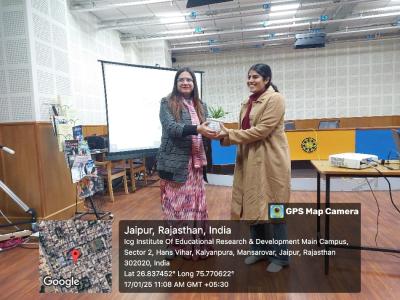Film Screening and Discussion with Maheshwari Shekhawat

Name of the Department: Department of Journalism and Mass Communication
Name of the Event/Activity/Workshop/Seminar: Film Screening and Discussion
Date: January 17th, 2025
Venue: AV Studio
Topic on which activity was organized: Film Making
No. of Participants/Beneficiaries (Teaching/Non-teaching/Students to be mentioned separately): 18 (UG and PG students of the Department of JMC, BA, BBA, B.Sc and BFA).
Name of the activity Coordinators: Dr. Ruchi Goswami
Name of Collaborating Agency (if any) with address & contact no.: Lens-Craft Club, IIS (deemed to be University)
Objective of the workshop/seminar/activity: The primary objective of the Film Screening and Discussion workshop was to provide students with a comprehensive understanding of the filmmaking process, from conceptualization to distribution. By inviting filmmaker Ms. Maheshwari Shekhawat as the resource person, the workshop aimed to bridge the gap between theoretical knowledge and practical application in cinema. It sought to familiarize students with the five key stages of film production development, pre-production, production, post-production, and distribution helping them grasp the complexities involved in bringing a film to life.
Description (max 500 words):
The Department of Journalism and Mass Communication, in collaboration with the Lens-Craft Club, organized a Film Screening and Discussion on January 17, 2025, at the AV Studio. The session was led by filmmaker Ms. Maheshwari Shekhawat, who provided valuable insights into the filmmaking process while also discussing Meghna Gulzar's cinematic contributions. Students and faculty members eager to understand the intricacies of film production and storytelling attended the event.
Ms. Shekhawat began the session by explaining the various stages of filmmaking. She elaborated on the development phase, where a film’s idea is conceived, a script is written, and research is conducted to ensure the story is compelling and authentic. She emphasised that this phase is crucial as it sets the foundation for the film. Moving on to pre-production, she described how casting, location scouting, budgeting, and scheduling occur. This phase requires meticulous planning to ensure smooth execution during filming.
She then discussed the production stage, where the actual shooting happens. Here, directors, cinematographers, and actors work together to bring the script to life. She highlighted how cinematography, lighting, and sound design contribute to visual storytelling. Following this, she detailed the post-production phase, where raw footage is edited, sound effects and background music are added, and visual effects are applied. She explained how editing plays a vital role in shaping the final narrative. Finally, she spoke about distribution and marketing, explaining how films are released in theatres, on streaming platforms, or at film festivals, accompanied by promotional campaigns to reach audiences effectively.
Ms. Shekhawat discussed the films of Meghna Gulzar, emphasizing her unique storytelling approach and her ability to bring socially relevant narratives to the screen. She spoke about Gulzar’s breakthrough film Talvar, which was based on the real-life Aarushi Talwar murder case. She highlighted how the film’s investigative structure and multiple perspectives made it a compelling watch. She also discussed Raazi, a critically acclaimed spy thriller that depicted the journey of an Indian woman who became an undercover agent in Pakistan. She noted how the film blended patriotism with emotional depth, making it a standout in contemporary Indian cinema.
Further, she explored Chhapaak, a film based on the life of acid attack survivor Laxmi Agarwal. She admired Gulzar’s sensitive handling of the subject, emphasizing how cinema can be a powerful tool for social change. She encouraged students to study such films to understand how strong narratives, realistic performances, and meticulous research contribute to impactful storytelling.
The session concluded with an engaging discussion where students asked questions about the technical and creative aspects of filmmaking. Ms. Shekhawat encouraged budding filmmakers to experiment with storytelling and stay committed to their vision. The event provided valuable knowledge and inspiration, leaving attendee with a deeper appreciation for the art of filmmaking.
Outcome of the activity/event/seminar/workshop: The Film Screening and Discussion workshop proved to be highly enriching for the participants, leaving them with a deeper understanding of the multifaceted nature of filmmaking. One of the key outcomes was that students gained a clear and structured insight into the five stages of film production. From the initial concept to the final release, students learned about the challenges and meticulous planning involved at each stage. This knowledge will help them approach their creative projects with a more informed and organized mindset.

